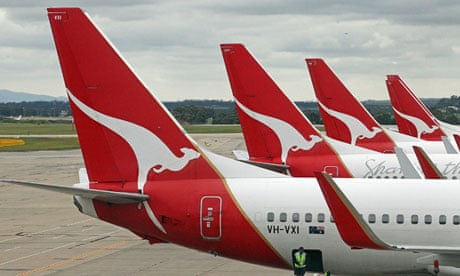Australia's flagship carrier, Qantas Airways, swung to a worse than expected second-half net loss on Thursday and cancelled orders for 35 Boeing 787 Dreamliner aircraft worth some $8.5bn (£5.35bn) as it seeks to cut costs.
The announcement came as the Qantas chief executive and several other Australian bosses said they would not take their bonuses for 2012 after corporate performances that have not reflected the country's booming economy.
Qantas's Alan Joyce and BHP Billiton's Marius Kloppers are forgoing big bonuses this year as a pre-emptive move under tough new laws on executive pay. Under the so-called "two strikes" rule, if more than 25% of shareholders vote down the executive pay scheme for two consecutive years the board can be thrown out and new elections held.
BlueScope Steel boss PaulO'Malley got in early last week, saying he would not claim his performance bonus or salary increase to take responsibility for a $1.04bn ($1.09bn) full-year loss. Last year he took home $2.7m in recommended bonuses and salary rises.
BHP's Kloppers has passed on his multi-million dollar bonus after the world's biggest miner said it was booking $3.3bn in writedowns.
Qantas said that Joyce – who caused a furore when he accepted a salary package including bonuses of A$5m last year despite a sharp fall in profits – would not seek bonus options this year. Joyce will still take home a base salary of $2.3m.
Rio Tinto's Tom Albanese kicked off the trend in February, forfeiting his 2011 bonus payment after the firm took an $8.9bn writedown on assets bought under his watch.
John Egan, principal partner at Egan Associates, a leading corporate remuneration advisor, said shareholders were waking up to the fact that many Australian companies were underperforming relative to growth paths before the global financial crisis. "Until 2010 we felt OK in Australia because we weren't being beaten up as badly as the US, UK and Europe," Egan said.
"Now there's a recognition that while our performance has been better than many of those internationally, we haven't done that well. The line's being drawn not on the relative performance in comparison to the worst, but where they should be."
Qantas's second-half underlying loss before tax was $107m (£71m), compared with a $135m profit a year earlier, according to Reuters calculations, dragged down by a soaring fuel bill and its underperforming international division.
The airline posted a full-year net loss of $244m, its first loss since privatisation in 1995, and in line with expectations of a $248m loss.
The carrier has embarked on a five-year turnaround strategy announced last year to improve its sagging fortunes amid tough conditions for international travel and rising competition at home.
Qantas is separating its loss-making international business from its profitable domestic unit, eliminating loss-making routes, axing 2,800 jobs and slashing capital spending over two years by $700m.
It has faced fierce competition from Virgin on its domestic routes and battles with Asian and Middle Eastern carriers internationally.
